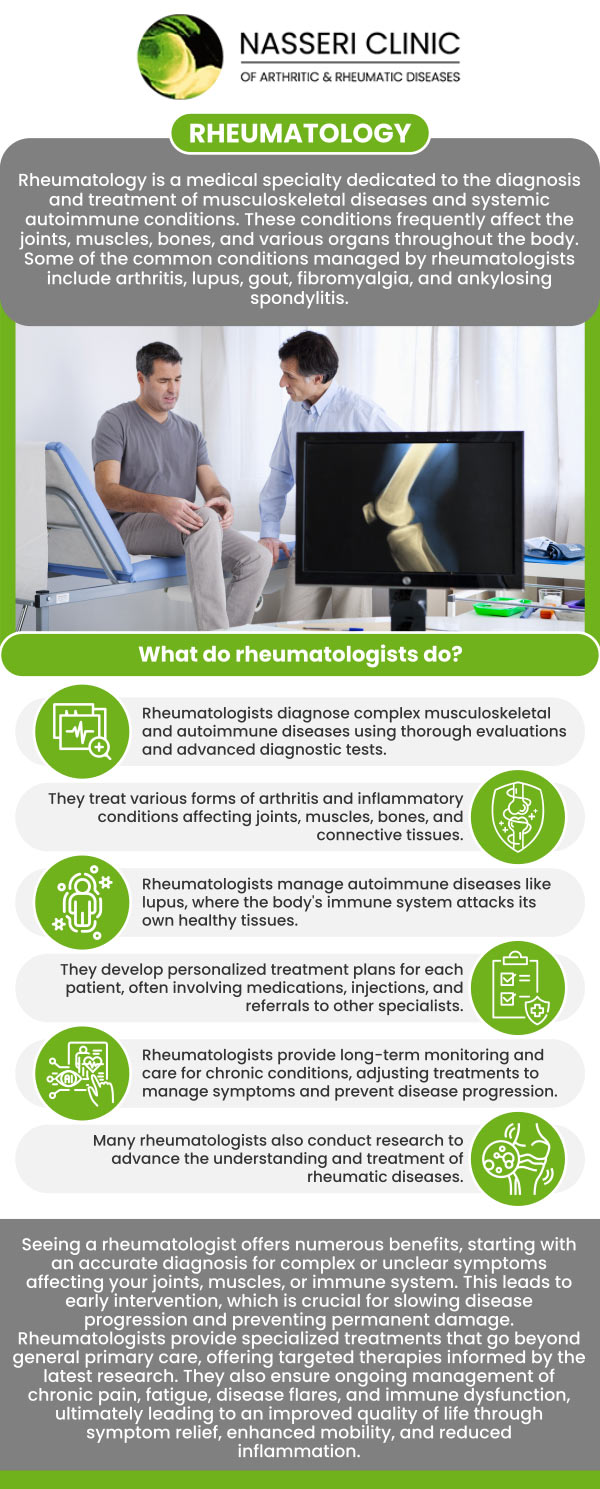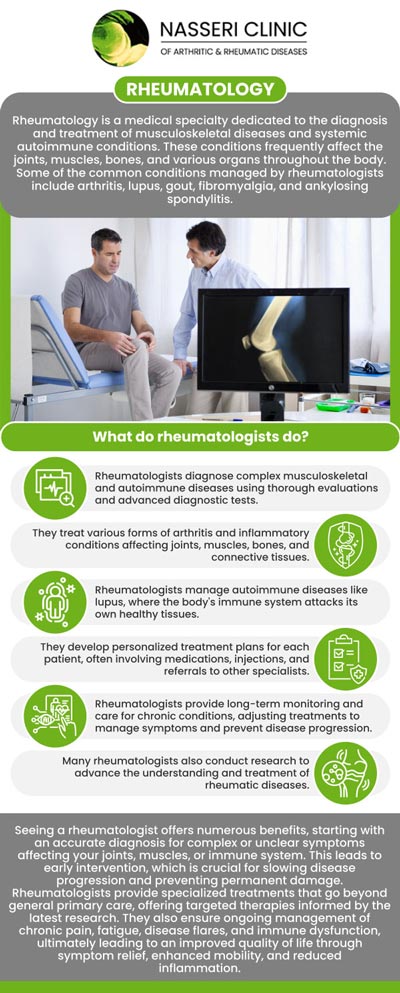Rheumatologists Accepting New Patients in North Baltimore, MD
Finding a rheumatologist accepting new patients in North Baltimore, MD, ensures you receive expert care for a variety of conditions, including arthritis, lupus, and joint pain. Our dedicated specialists at Nasseri Clinic of Arthritic and Rheumatic Diseases offer personalized treatment plans designed to improve mobility and manage symptoms effectively. Whether you’re dealing with chronic inflammation or a new diagnosis, our rheumatologists provide compassionate and comprehensive care tailored to your needs. For more information, contact us or book an appointment online. We are conveniently located at 3333 N. Calvert St, Suite 540B, Baltimore, MD 21218.


Table of Contents:
How can I find rheumatologists currently accepting new patients?
What conditions do rheumatologists treat for new patients?
Do I need a referral to see a rheumatologist as a new patient?
What should I expect during my first rheumatology appointment?
Finding a rheumatologist who is currently accepting new patients can feel like a daunting process, but there are several straightforward steps you can take to make your search more efficient. A great place to start is by consulting your primary care physician (PCP). They often have a trusted network of specialists and can provide a direct referral, which is often a requirement for many insurance plans. Additionally, you can utilize online healthcare directories and platforms. Websites like Zocdoc or Healthgrades allow you to filter by specialty, location, and insurance plan, and often indicate whether a doctor is accepting new patients. Another reliable method is to directly check the website of your health insurance provider, as they maintain an updated list of in-network specialists. Finally, never hesitate to call the clinics directly. The front office staff can quickly confirm their patient status and answer any preliminary questions about your specific condition. Taking these steps will help you connect with a specialist who can provide the care you need.
Rheumatologists are specialists in diagnosing and treating diseases of the joints, muscles, and bones. Their expertise extends to a broad spectrum of conditions, primarily focusing on autoimmune and inflammatory disorders that can affect the body in complex ways. For new patients, a rheumatologist will conduct a thorough evaluation to identify the root cause of symptoms such as joint pain, swelling, stiffness, or fatigue. The most common conditions they treat include:
Rheumatoid Arthritis (RA): A chronic inflammatory disorder that can affect joints and other organs.
Osteoarthritis: The most common form of arthritis, caused by the breakdown of joint cartilage.
Lupus (Systemic Lupus Erythematosus): A chronic autoimmune disease that can damage joints, skin, and organs.
Gout: A form of arthritis caused by a buildup of uric acid crystals in the joints.
Psoriatic Arthritis: A type of inflammatory arthritis that affects some people with psoriasis.
Ankylosing Spondylitis: A chronic inflammatory disease that primarily affects the spine.
This list represents just a few of the many conditions a rheumatologist is equipped to diagnose and manage, providing crucial support to improve a patient’s quality of life.
Whether you need a referral to see a rheumatologist largely depends on the type of health insurance plan you have. For most individuals with a Health Maintenance Organization (HMO) plan, a referral from your primary care physician (PCP) is a mandatory first step. This process ensures that your care is coordinated and covered by your insurance. Without a referral, your insurance may not cover the cost of the rheumatologist’s visit, leaving you responsible for the full amount. In contrast, if you have a Preferred Provider Organization (PPO) plan, a referral is typically not required. PPO plans offer more flexibility, allowing you to see specialists directly without prior authorization from your PCP. However, even with a PPO, a referral can be highly beneficial, as your PCP can provide the specialist with essential background information on your medical history, recent lab work, and current symptoms, facilitating a more comprehensive and efficient initial consultation.
Your first visit to a rheumatologist is a crucial step in understanding and managing your condition. It is primarily an information-gathering session where the specialist will work to understand your unique health situation. To ensure a productive appointment, you should arrive prepared with several key items. Expect to have an in-depth discussion about your medical history, including any previous diagnoses, recent symptoms, and how they have progressed over time. The rheumatologist will perform a physical examination to check your joints, muscles, and mobility. Additionally, they may order blood tests, urine tests, or imaging studies to gather more information and confirm a diagnosis. This initial visit is a partnership, so be ready to ask questions and discuss your concerns openly. Bringing the following items with you will significantly help your specialist:
• A list of all current medications, including dosage.
• A summary of your recent symptoms, including when they started and what makes them better or worse.
• Copies of any relevant medical records or test results from your PCP.
Visit Nasseri Clinic of Arthritic and Rheumatic Diseases in North Baltimore, MD, to schedule an appointment with a rheumatologist accepting new patients and begin your journey toward better health. For more information, contact us or book an appointment online. We are conveniently located at 3333 N. Calvert St, Suite 540B, Baltimore, MD 21218. We serve patients from North Baltimore MD, Dundalk MD, Halethrope MD, Ferndale MD, Yorktown MD, and surrounding areas.
Check Out Our 5 Star Reviews


Additional Services You May Need

Additional Services You May Need
▸ Arthritis Care
▸ Infusion Therapy
▸ Lab Services
▸ Radiology
▸ NCARD NRACE
▸ BioFlex Laser Therapy
▸ Ultrasound Guided Injection
▸ NCARD PRP
▸ NCARD Myers
▸ Rheumatology
▸ Myositis
▸ Osteoporosis
▸ Ulcerative Colitis
▸ Multiple Sclerosis
▸ Saphnelo Infusion
▸ Injection Treatments
▸ Intravenous Immunoglobulin Therapy
▸ Asthma
▸ Crohn’s Disease
▸ Fibromyalgia
▸ Infusion Therapy for Gout
▸ Inflammatory Eye Disease
▸ Inflammatory Skin Disease
▸ Vasculitis
▸ Iron Deficiency
▸ Lupus


